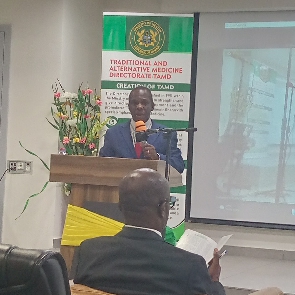The Executive Director of the Centre for Plant Medicine Research at Mampong, Prof. Alex Asaase, has stated that there are no side effects of using herbal medicine to the extent that they cause kidney or liver problems. He made this assertion in his opening remarks when he chaired the induction ceremony of some 36 medical herbalists by the Traditional Medicine Practice Council (TMPC) at the Ministry of Health Auditorium on Friday, September 30, 2022. The ceremony was graced by the Deputy Minister of Health in charge of Traditional Medicine Practice, Tina Mensah. According to Prof. Alex Asaase, the strong media narrative of herbal medicine causing kidney and liver diseases are baseless, rather, “the benefits of herbal medicines are enormous.” He was of the view that “high cost of production, lack of training for herbalists, scarcity of plant raw materials as well as high laboratory equipment cost have been a hindrance to” the rapid growth of “herbal medicine practice” in the country. Speaking on the theme of the induction ceremony, “Government Policy on Digitalization of Traditional Medicine,” he indicated the government’s drive to replace manual processes with technological innovation in the orthodox healthcare system. Furthermore, healthcare technologies such as artificial intelligence-enabled machines, e-health, and telemedicine have greatly improved the overall efficiency and the standard of healthcare delivery across the globe and these he urged the Medical Herbalists to take advantage of. To him, the importance of traditional medicine cannot be underestimated and with the advent of COVID-19 pandemic, traditional medicine practitioners and manufacturers have insisted that if the virus attacks the immune system of its host and a strengthening of that immune system protects the host from it then, they have a lot of herbal portions to combat it because the majority of these herbal portions they produce are immune boosters. To that extent, “a funding agreement worth about GHc 1.8 million was signed between the COVID-19 National Trust Fund and the Centre for Plant Medicine Research” (CPRM) to evaluate antiviral activity on plant products and extracts to determine an effective dosage to combat the COVID-19 virus. This fourth induction of the Medical Herbalists is a cohort of three batches of graduates who have graduated with a BSc in Herbal Medicine from the Kwame Nkrumah University of Science with two years of clinical at the CPRM and the Tetteh Quarshie Memorial Hospital all in Mampong. Taking the audience through the clinical processes the graduates are subjected to at the CPRM at Mampong, Dr. Mavis Boakye-Yiadom, Head of the Clinic at the CPRM narrated that, the graduate/interns are exposed to a real clinic environment where they have an Out-Patient Department (OPD) where the bio-statistics and other vital information of the patients are taken. The consulting room is where the ailment of the patient is diagnosed and the appropriate herbal medicine is prescribed. Then to the pharmacy where the prescribed herbal medicine is issued to the patient. These processes are followed through at the Tetteh Quarshie Memorial Hospital with the difference being that, at the CPRM, these graduates/interns are taken through the process of identifying herbal plants, how such plants are cultivated and how the active ingredients extracted for application. Since 2017 when this program started, 138 Medical Herbalists have been taken through these processes with 2022 recording the highest number of 40 interns. Speaking on the theme, Dr. Kofi Busia, who was the thematic speaker for the event and himself a Medical Herbalist and the foubder of the Ghana Assosiation of Medical Herbalists (GAMH), emphasized the need for the inductees to embrace and utilize Information Communication Technology (ICT) to improve on the traditional/ herbal medicine healthcare delivery in the country. According to him, Government of Ghana’s ICT policy document aims at improving ICT infrastructure in the health sector, timely dissemination of health information and the deployment of telemedicine applications to enhance the referral, emergency and disaster management systems. Furthermore, the document aims at “improving ICT knowledge, capability and utilization among health workers by providing training in ICT skills to all prospective and current health workers” to enhance their functions in providing quality healthcare delivery at all levels. He said, the object of the document additionally aims at maintaining a critical group of ITC specialists in the health sector data management, protect data from cyber fraudsters and to protect patient information from cyber predators. To him the need for the specialists are very critical if the healthcare delivery in the country is to engage ICT tools such as wearable devices, telehealth and telemedicine, health apps, digital monitoring and personalized medicines which assists a doctor to have personalized interactions with patients regardless of their locations since patients can access healthcare online. To that extent, the Nurses and Midwifery Council in their fraternal message assured the inductees that, the Council has been assisted to establish a digital platform which they are ready to place at the disposal of the Medical Herbalists if they decide to harness ICT in their operations. For Dr. Arthur who delivered a fraternal message from the Ghana Alternative Medicine Practitioners Association (GAMPA) was visibly ‘furious’ when delivering the message because to him, he will not understand why the Medical Herbalists are not allowed to refer to themselves as ‘doctor’. “A patient comes to you, his/her ailment is diagnosed and the appropriate herbal medicine is prescribed and the person gets well and calls you ‘doctor’ but you are not allowed to refer to yourself as a doctor”. In view of that, he was advocating that, if the number of years it takes the medical herbalists to graduate or the course content is what is placing that restriction, then the appropriate authorities should revise whatever is placing that restriction for the medical herbalists to call themselves “doctors”. In her address, the Deputy Minister in Charge of Traditional Medicine at the Ministry of Health, Hon. Tina Mensah placed emphasis on government’s effort on digitalizing the health care delivery environment and the need for the Medical Herbalists to adapt to the use of ICT tools in their operations. According to her, “successive governments have since continued to develop favorable policy frameworks, fostering innovation and improving traditional medicine practice” leading the integration of Traditional Medicine facilities integration into 55 Government Hospitals across the country. In her welcome address, the Ag. Registrar of the TMPC, Dr. Mrs. Anastasia Yirenkyi, congratulated the inductees for going through these rigorous training at the KNUST and the Clinical at the CPRM and the Tetteh Quarshie Memorial Hospital. Her worry was why the Medical Herbalists will refuse taking up posts in the rural areas whenever they are posted. She advised them that, they occupy a critical section of health care delivery experts in the country and for that matter, the traditional medicine fraternity need not be left out of the digitalization revolution which is being championed by Vice President H.E. Dr. Mahamudu Bawumia in the last four years. Pieces of advice were given to the inductees and a profound from the President of the Ghana Federation of Traditional Medicine Associations (GHAFTRAM), Nana Kojo Odum Eduful was that, the inductees having been through University should not look down on those practitioners who have not gotten any higher education and by this, he was referring to mostly, the indigenous practitioners. According to him, all that they have gone to learn at University was achieved mostly through the research of these people so, they need to operate with humility giving respect to everyone regardless the person’s social status.













